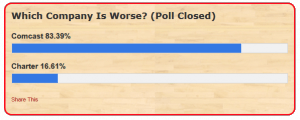 “If your house was destroyed, and you have looked around the neighborhood for our cable box and cannot find it, you owe us $212 and you need to either pay us or make an insurance claim on our behalf.”
“If your house was destroyed, and you have looked around the neighborhood for our cable box and cannot find it, you owe us $212 and you need to either pay us or make an insurance claim on our behalf.”
Those were the exact words of a Charter Cable representative talking to a storm victim who lost her home, possessions, and yes, Charter Cable’s set top box. Stop the Cap! reader Jake from Alabama shared the story of his friend Kelly — a single mother with three kids who lived in Jefferson County, until last month’s tornado flattened her home and scattered everything the family owned for miles around. Kelly is now living with her parents in Georgia and trying to sort through insurance claims, school for her children, her future career, and the cable company.
“She told me everyone was wonderful, offering food, aid, temporary shelter, and even assistance with insurance claims,” Jake writes. “Everyone but Charter Cable, who immediately demanded payment for equipment that could have blown into the next county.”
Kelly told Jake the other utilities were glad to help suspend service to her now non-existent home. The phone company is even forwarding phone calls to her Alabama phone number, which now connects to her cell phone. Nobody asked for a penny, and all expressed sorrow for the loss. Charter Cable expressed an interest in Kelly’s credit card number to pay for her lost cable box.
 “She told me the woman at Charter demanded to know if she was not prepared to pay today, when would she file her insurance claim so the company can get paid,” Jake says. “Even worse, if she didn’t pay, they would assess late fees and turn her over to a collection agency.”
“She told me the woman at Charter demanded to know if she was not prepared to pay today, when would she file her insurance claim so the company can get paid,” Jake says. “Even worse, if she didn’t pay, they would assess late fees and turn her over to a collection agency.”
Cable companies demanding payment for lost or destroyed cable equipment is nothing new. Stop the Cap! has documented instances where operators demand payment for cable boxes destroyed in fires, even when the customer lacks insurance.
“It’s become a hot topic in Birmingham and storm-damaged areas because relief workers are hearing horror stories from customers, some injured, who are told to start combing through adjacent yards to look for their lost cable equipment,” Jake says.
 Bright House Networks, which also provides service in some storm-damaged areas, has been particularly nasty.
Bright House Networks, which also provides service in some storm-damaged areas, has been particularly nasty.
Jake notes one local talk show featured a caller who shared the story of a Bright House representative who told the customer she would wait on the phone while she searched the backyard for Bright House’s DVR box.
“It was disgusting, and Bright House told a Birmingham newspaper it was their policy to demand homeowners file insurance claims on the cable company’s behalf so they can get paid full value for their damaged, usually previously used, cable equipment,” Jake says.
In fact, that is Bright House Networks’ policy, notes the Birmingham News:
Bright House Networks, whose service area includes hard-hit Pratt City, also expects its customers to file claims under homeowners’ or renters’ insurance to pay for lost or destroyed cable boxes. “That’s how we normally handle it,” spokesman Robert L. Smith said.
If storm victims don’t have insurance, he said, decisions will have to be made on a case-by-case basis.
“For those who have lost everything, talking to a cable company is probably the last thing on their minds,” Smith said. “We’re not going to pressure someone for a set-top box.”
But in fact cable companies have pressured customers into paying for lost equipment and told they’ll get their money back from the final insurance settlement.
“The problem here isn’t so much that Charter and Bright House want to get paid for destroyed equipment, it’s how zealous they are about getting paid right now, even as people are still wrapping their hands around the cards dealt to them by the massive tornado damage,” Jake says.
The News notes not every cable company is out for customers’ credit card numbers:
Among other television services, AT&T’s U-verse customers who lost their leased equipment in the storm can have it replaced at no charge, company spokeswoman Sue Sperry said.
DirecTV waives replacement costs for equipment damaged in storms if customers continue services, spokeswoman Vanessa Dunham said. If service can’t be restored because of damage to the home, DirecTV offers to cancel the account and waive fees for not returning equipment, she said.
[Update 5/20: Charter Communications sent a statement saying, in part: Charter will not charge customers for missing, destroyed, or damaged equipment as a result of the recent tornadoes. We adjusted our policy shortly after the tornado in response to the large-scale and catastrophic nature of this storm. We have now confirmed the company is now crediting customers for lost or damaged equipment.]


 Subscribe
Subscribe






